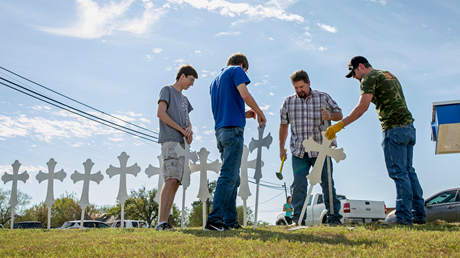A Texas Baptist pastor on the risk and resilience of America’s smallest congregations.

By any measure, Sunday’s mass shooting at the First Baptist Church of Sutherland Springs, Texas, breaks records we’d rather not see broken. Texas Gov. Greg Abbott characterized it as the worst mass shooting in the history of our state and among the worst in the country’s recent history. It is the deadliest church shooting on record.
Superlatives abound as our society scrambles to understand what these things mean. Framed in an overarching narrative of the decline of American civility or debates over gun-politics or increasing hostility toward people of faith, the shooting serves as a data point for the more cerebral and an exclamation point for the more passionate.
When you remove the framework and look at the story of a small church in a rural town, this event defies ranking or evaluation.
For the First Baptist Church of Sutherland Springs, it is an extinction-level event. The church’s lay leadership have all been murdered. The preponderance of the church’s surviving membership lies in the hospital. Eight of the slain come from a single family.
The worship center lies smothered in the carnage and riddled with bullet holes. Who’s going to clean it? Who’s going to pay to have it cleaned? The people who have taken care of those needs in the past were carried out of the meeting house on stretchers and gurneys.
The death of 26 members would traumatize any church, but for a church this size, it threatens the church’s very existence. It threatens that small church; it frightens every small church. Most of the pastors of small churches across the nation know someone whom they could imagine committing a similar crime.
The definition of the family and the nature of childhood in America is …
Source: Christianity Today Most Read